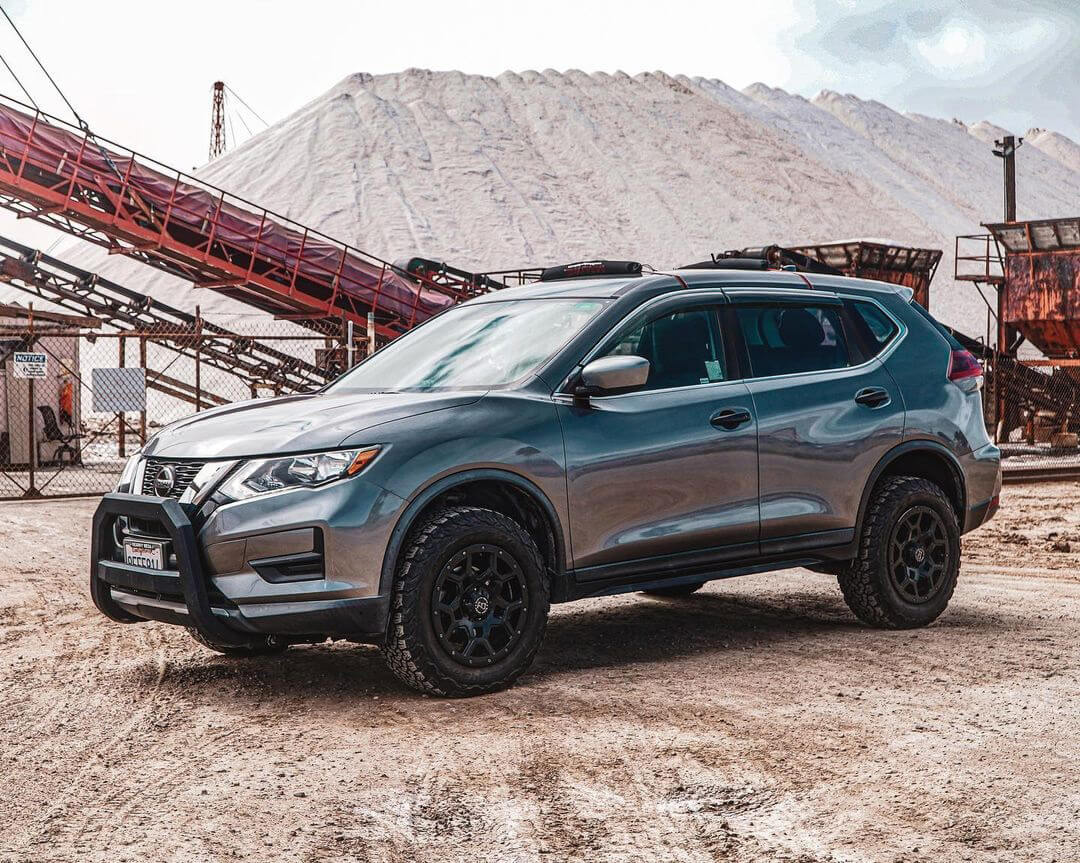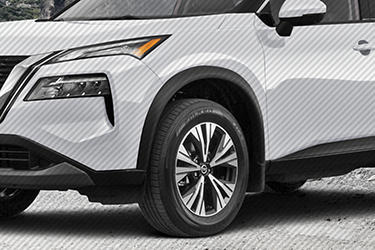Nissan Rogue tires typically last between 40,000 to 60,000 miles. Driving habits and maintenance can influence tire longevity.
Tires play a crucial role in your vehicle’s performance, safety, and fuel efficiency. The Nissan Rogue, a popular compact SUV, is known for its versatility and comfort. How long its tires last helps you plan for replacements and maintain optimal performance.
Regular maintenance, including rotations and alignments, can extend tire life significantly. Weather conditions and driving styles also affect tire wear.
Knowing these factors ensures you’re well-prepared for any upcoming tire changes. Investing in quality tires tailored to your driving needs enhances safety and improves the overall driving experience.
Learn more about how long Nissan Rogue tires last.
Nissan Rogue Tires

Credit: offroadium.com
Nissan Rogue tires play a crucial role in safety and performance. Initial quality impacts their lifespan significantly. High-quality tires provide better grip and durability. They can last between 40,000 to 70,000 miles. Proper maintenance also extends their life. Regularly check tire pressure and tread depth. Rotate tires every 5,000 to 7,500 miles for even wear.
Different driving conditions affect tire longevity. Aggressive driving and rough roads can cause faster wear. Choosing the right tires for your climate is essential. All-season tires work well in various conditions. For extreme climates, consider season-specific tires.
Investing in quality tires ensures safety and comfort. Regular inspections help catch issues early. This proactive approach saves money in the long run.
Factors Influencing Tire Lifespan
Driving habits play a big role in tire lifespan. Aggressive driving can wear tires faster. Smooth driving helps tires last longer.
Road conditions also affect tire longevity. Rough and uneven roads cause more damage. Wet or icy conditions can lead to quicker wear.
Regular maintenance routines are crucial. Check tire pressure often to prevent issues. Rotate tires every 5,000 to 7,500 miles for even wear.
Average Lifespan of Nissan Rogue Tires

Credit: www.sayernissan.com
The average lifespan of Nissan Rogue tires is about 50,000 to 70,000 miles. This can vary based on driving habits and road conditions. Regular maintenance plays a big role in tire longevity. Proper inflation and alignment keep tires healthy.
Manufacturers often claim their tires can last up to 80,000 miles. This depends on the type of tire used. All-season tires might wear out faster than winter tires.
Real-world reports show mixed results. Many drivers report a tire life of around 40,000 to 60,000 miles. Factors like weather, road type, and driving style greatly affect wear. It’s important to check tires regularly for signs of damage.
Signs of Tire Wear And Tear
Tire wear can be noticed through visual cues. Look for cracks, bald spots, or uneven wear. These signs mean your tires need attention. Tread depth is important too. Use a penny to check it. If you can see Lincoln’s head, it’s time for new tires.
Performance issues may arise as tires age. Listen for noises like humming or thumping. These sounds could mean a problem. Vibration while driving is another red flag. It can indicate poor alignment or imbalance. Pay attention to these signs to ensure safety.
Maintenance Tips for Longer Tire Life
Regular inspections are key to ensuring your Nissan Rogue tires last longer. Check for uneven wear or damage. Look for cracks and bulges regularly.
Maintaining proper inflation helps improve tire life. Under-inflated tires wear out faster. Use a tire gauge to check pressure monthly.
Timely rotations promote even wear across all tires. Rotate your tires every 5,000 to 7,500 miles. This simple step can extend their lifespan.
When To Replace Your Nissan Rogue Tires?

Credit: www.discounttire.com
To know when to replace your Nissan Rogue tires, consider the mileage. Most tires last between 25,000 and 50,000 miles. Check your owner’s manual for specific recommendations.
Age is another important factor. Tires can degrade over time, even if they have low mileage. Replace tires that are six years old or older, regardless of tread depth.
Choosing The Right Replacement Tires
Choosing the right replacement tires for your Nissan Rogue is essential. Size and type matter greatly. Tires must match your vehicle’s specifications. Check your owner’s manual for the correct size. All-season tires are popular choices for versatility.
Brand and quality are equally important. Well-known brands often provide better performance. Look for tires with good reviews and ratings. Quality tires last longer and offer better safety. Investing in reputable brands can save money in the long run.
Cost Considerations And Savings Tips
Budgeting for new tires is important for every Nissan Rogue owner. Tires usually last for about 50,000 to 70,000 miles. Set aside money each month for new tires. This helps avoid sudden expenses. Check the tire’s tread depth regularly. Replace them before they wear out. This saves money in the long run.
Finding deals and discounts can make buying tires easier. Look for sales at local tire shops. Many online retailers offer discounts too. Sign up for newsletters to receive special offers. Use comparison websites to find the best prices. Consider buying tires in sets of four for better deals.
Conclusion: How Long Do Nissan Rogue Tires Last?
The lifespan of Nissan Rogue tires typically ranges from 50,000 to 70,000 miles, depending on driving habits, road conditions, and maintenance. Regular rotation, proper inflation, and alignment checks can extend their life. Aggressive driving or harsh climates may reduce longevity. Inspect tires regularly for wear and replace them if tread depth falls below 2/32 inches or if damage is present.
FAQs About Nissan Rogue Tires
How many miles should tires last on a Nissan Rogue?
The lifespan of tires on a Nissan Rogue typically ranges between 40,000 to 60,000 miles, depending on driving habits, road conditions, and tire type. Regular maintenance, such as proper inflation, rotation, and alignment, can extend tire life. All-season tires may last longer, while performance tires wear faster. Always monitor tread depth and replace tires when worn below 2/32 of an inch for safety and optimal performance.
When should I replace my Nissan Rogue tires?
Replace your Nissan Rogue tires when the tread depth is below 2/32 of an inch, or if you notice uneven wear, cracks, bulges, or frequent air loss. Most tires last 5-6 years, but check the manufacturer’s recommendations. Regular inspections, especially before long trips or seasonal changes, ensure safety and performance. If you experience reduced traction, longer braking distances, or vibrations, it’s time to consider replacement.
What are the standard tires for Nissan Rogue?
The Nissan Rogue typically comes with all-season tires as standard, with sizes varying by trim and year. Common sizes include 225/65R17 for base models and 235/55R19 for higher trims. These tires are designed to provide a balance of comfort, traction, and durability for everyday driving.
What does tire maintenance mean on a Nissan Rogue?
Tire maintenance on a Nissan Rogue involves regular checks and actions to ensure optimal performance, safety, and longevity. This includes monitoring tire pressure, rotating tires every 5,000-7,500 miles, checking tread depth, and inspecting for damage or uneven wear. Properly inflated and maintained tires improve fuel efficiency, handling, and braking. Refer to the owner’s manual for specific recommendations, and use the Tire Pressure Monitoring System (TPMS) to monitor pressure levels.
What size tires does a Nissan Rogue use?
The Nissan Rogue typically uses tire sizes ranging from 225/65R17 to 235/55R19, depending on the trim level and year. The base models often come with 17-inch wheels, while higher trims may feature 18-inch or 19-inch wheels. Always check the owner’s manual or the tire placard on the driver’s side door jamb for the exact size recommended for your specific vehicle to ensure optimal performance and safety.
Does Nissan Rogue have a spare tire?
The Nissan Rogue typically does not come with a traditional spare tire. Instead, many models are equipped with a tire repair kit, which includes a sealant and an air compressor to temporarily fix minor punctures. However, some trims or optional packages may offer a compact spare tire. It’s best to check your specific vehicle’s configuration or consult the owner’s manual to confirm what is included.
